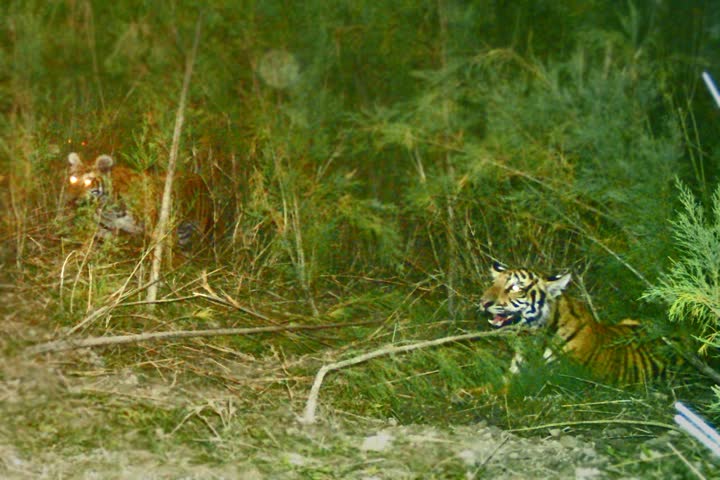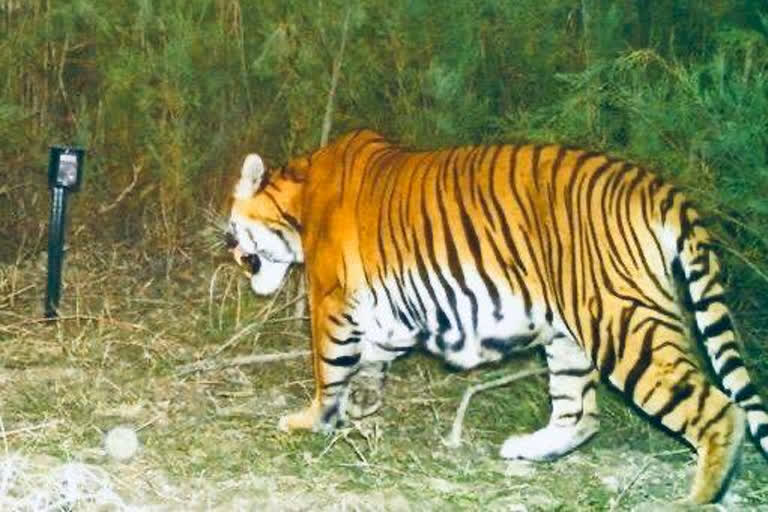Nagaon: Amid the news of flood and its devastation, the first evidence of tiger breeding captured on a camera trap inside Assam’s Laokhowa Burhachapori wildlife sanctuary brought cheer, particularly to those in love with wildlife and its conservation.
"The roar gets louder"--announced the official twitter handle of Kaziranga National Park and Tiger Reserve recently. Officials said that two cubs of the Royal Bengal Tiger were camera trapped during a recent exercise carried out inside the sanctuary. The officials said that the cubs are between one to two years old and their sexes are yet to be ascertained.
-
Introducing “THE FUTURE KINGS”
— Kaziranga National Park & Tiger Reserve (@kaziranga_) July 26, 2020 " class="align-text-top noRightClick twitterSection" data="
This picture speaks a 1000 words.
Culmination of 15 years of determination and tireless work of Foresters. We thank NGOs, Media, Volunteers and everyone who worked with forest department in this🙏🙏 pic.twitter.com/NDpzD6LwXR
">Introducing “THE FUTURE KINGS”
— Kaziranga National Park & Tiger Reserve (@kaziranga_) July 26, 2020
This picture speaks a 1000 words.
Culmination of 15 years of determination and tireless work of Foresters. We thank NGOs, Media, Volunteers and everyone who worked with forest department in this🙏🙏 pic.twitter.com/NDpzD6LwXRIntroducing “THE FUTURE KINGS”
— Kaziranga National Park & Tiger Reserve (@kaziranga_) July 26, 2020
This picture speaks a 1000 words.
Culmination of 15 years of determination and tireless work of Foresters. We thank NGOs, Media, Volunteers and everyone who worked with forest department in this🙏🙏 pic.twitter.com/NDpzD6LwXR
"The discovery of the two cubs during the recently conducted camera trap exercise makes Laokhowa-Burhachapori one of the very few established breeding grounds of tigers in northeast India. Tigers avoid breeding in disturbed habitats and the discovery of the cubs in the sanctuary complex establishes empirically that the conservation scenario of Laokhowa-Burhachapori has improved considerably than it used to be about a decade back," a senior official said.
-
ROAR GETS LOUDER🐯
— Kaziranga National Park & Tiger Reserve (@kaziranga_) July 26, 2020 " class="align-text-top noRightClick twitterSection" data="
First ever camera trap evidence of successful breeding of tigers in Laokhowa Burhachapori Wildlife Sanctuary,🐅 buffer of Kaziranga Tiger Reserve. Result of more than 15 years of hard work and effort. Kudos 👏👏@ParimalSuklaba1 @moefcc @ntca_india @surenmehra pic.twitter.com/PwMooNWb8K
">ROAR GETS LOUDER🐯
— Kaziranga National Park & Tiger Reserve (@kaziranga_) July 26, 2020
First ever camera trap evidence of successful breeding of tigers in Laokhowa Burhachapori Wildlife Sanctuary,🐅 buffer of Kaziranga Tiger Reserve. Result of more than 15 years of hard work and effort. Kudos 👏👏@ParimalSuklaba1 @moefcc @ntca_india @surenmehra pic.twitter.com/PwMooNWb8KROAR GETS LOUDER🐯
— Kaziranga National Park & Tiger Reserve (@kaziranga_) July 26, 2020
First ever camera trap evidence of successful breeding of tigers in Laokhowa Burhachapori Wildlife Sanctuary,🐅 buffer of Kaziranga Tiger Reserve. Result of more than 15 years of hard work and effort. Kudos 👏👏@ParimalSuklaba1 @moefcc @ntca_india @surenmehra pic.twitter.com/PwMooNWb8K
He said that the camera trapped documentation of the presence of the Royal Bengal tiger in the Laokhowa Burhachapori WLS buffer complex of Kaziranga Tiger Reserve was first successfully done in February 2013. The recorded tiger was identified as an adult female, and it was found that it had migrated from the Eastern Range of the Kaziranga National Park to Laokhowa-Burhachapori.
This event had established Laokhowa-Burhachapori as a tiger habitat and corridor components of the greater central Assam conservancy landscape comprising of Kaziranga to the east, Orang national park to the west and the two wildlife sanctuaries in between with the Brahmaputra River acting as the umbilical cord joining all these components with each other, he said.

It may be mentioned here that the census was conducted by the Nagaon Wildlife Division as a participatory exercise by involving volunteers and researchers who were trained in the entire procedure. Significantly, the elusive mother and calves were documented in one of the camera traps which was set up by a team of volunteers and forest staff.
The trapping exercise has revealed the presence of 4 Royal Bengal Tigers, including the two cubs. "We suspect that there is one more full-grown male RBT present in the 1st addition area of the Burhachapori WLS and we hope that if we carry out an intensive trapping exercise in this region after the floodwaters recede, then we would be successful in capturing camera-trap photographs of this particular individual as well", said an official.
Assam had been witnessing a wave of devastating floods since May this year which had already killed 102 civilians so far. The floods have also affected the wildlife sanctuaries and national parks in Assam killing over 130 animals including one-horned rhinos, deers, etc. Over 85 per cent of the total area of the Kaziranga national park and Laokhowa Burhachapori wildlife sanctuary have already been flooded, also leading many animals to flee the protected areas.
ALSO READ | Sumatran tiger cub learns to hunt from mother at Poland zoo



